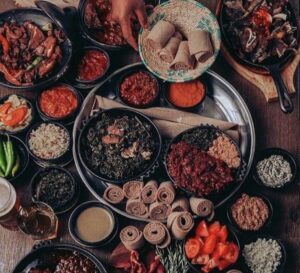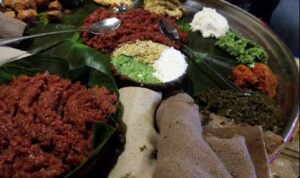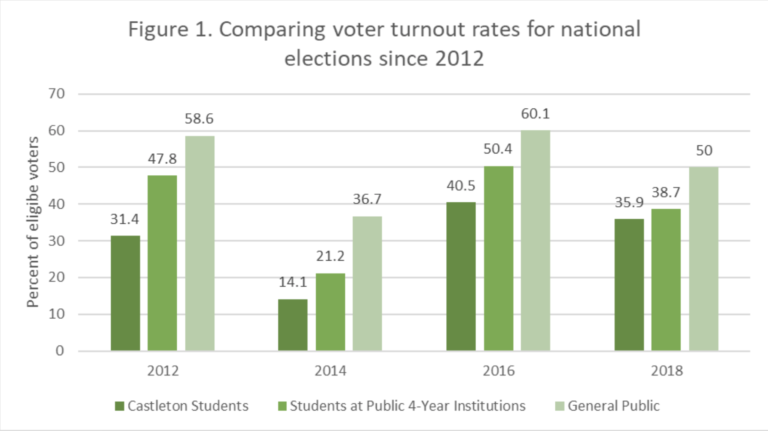Thinking of a different New Year 8,000 miles away

“I hope 2013 will bring peace and prosperity to our country,” my father said a few weeks ago on the Sept. 11 day of Ethiopian New Year.
I know, you’re probably confused when you read that.
A lot of people thought I was crazy when I posted Happy New Year 2013 on my social media stories. Some people had the decency to slide on my Snapchat story saying, “It’s 2020 fool, were you asleep for seven years?”
I just laughed and told them to Google it.
This is my third year in the United States. Until this point, I have missed three New Year’s and three Meskel (cross) celebrations; which is to remind us that Jesus died for us on the cross. In general, I have missed three of every holiday that my family celebrates.
Do I miss my family? Yes.
Do I miss the holidays? Not really.
You might think I am crazy for saying this, but hear me out.
Ethiopians have a very different way of celebrating holidays. I believe it’s because of the way we make our food. The onion and the spices have a very strong scent you can smell from a mile away. If you’re wearing your best outfit while someone is cooking, know that no matter how much perfume you put on, you will still smell like onions and spices.

Plus, people go all out buying the most expensive things to decorate their houses, which I think is very unnecessary because everything will go back to where it was after the holiday.
Depending on who you ask, the eve of New Year’s might be the best or the worst thing about the holiday. The best thing about it is that parents will be easy to manipulate. They will be so busy trying to make everything perfect for the family; they won’t pay attention to what you do. You also get to witness someone in your family getting finessed by a random dude trying to sell them something for cheap. It ends up them being mad when they realize it was a scam.
For instance, in my country, the closer the holidays the more expensive things are, especially the seasonings. These will be the best time for scammers to start operating. One time someone from my family bought small stones thinking they bought cardamoms (spices) for cheap.
That was one of the funniest things to observe.
You will also see your parent’s negotiation skills. In my culture, the man of the house, which is my father, buys the big stuff like lambs or sheep. Every time my father tries to buy something, this is how the conversation goes:
“How much is this lamb,” my father asks the merchant.
“You chose a good one sir; we only have one of this. The price will be 5,000 birrs,” the merchant says.
“Come on now. Another person asked for a 1,000 and I said no. I thought you would have a better price than the others, plus I will become your number one customer,” my father said.
This conversation will go for what feels like an hour and ends with my father getting the lamb for about 1,200 birrs.
Birr is Ethiopian currency, by the way. One American dollar is about 40 birrs.
Personally I don’t like the eve of any holiday. As the first daughter of the house, I was obligated to participate in everything that has to be done, most importantly making a special stew called “Doro Wot.”
On the morning of the eve, my mother and I start by peeling 10 kilograms of red onions. My eyes will be balling out the whole time because of the onions. When the onions are cooked well, we then add the spices and stir it to blend it well.
Then there is the hard part; parting the chicken. It’s easy for our moms because they have more experience, but I find it hard to learn without messing the whole chicken up.
“You better pay attention to what I am doing. I don’t want to see any mess when you do yours or else,” my mother says.
Everything had to be separated and washed thoroughly with lemons so it won’t smell. Then it’s added to the sauce and cooked all together.
This stew is special because it takes the whole day to make. Plus, one small thing can throw off the taste, so we had to be very careful. We also add other foods like Kitfo (a minced beef dish), Ayib (cheese but well-seasoned), and Gomen( collard greens). These need experience to make but they are not very time consuming.

I hated the process of doing all the work even though the end product was worth it. Call me lazy, but I just felt like it was too much.
But when I see the family all gathered the next day, it made me forget all the work that went through to make all that.
“You were complaining the whole time. Does your lazy self understand why now?” My mother says teasing me for the things I said the day before.






